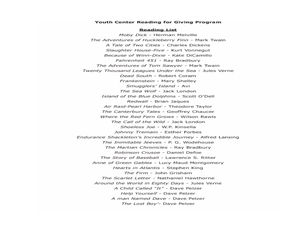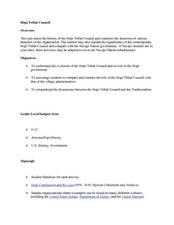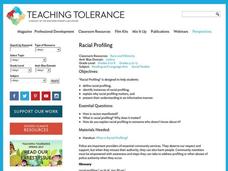Curated OER
Tech: Medical Forensics
High schoolers explore what it takes to be a forensic scientist or pathologist. They view a PowerPoint, discuss what education and skills are needed to succeed as a pathologist. They play a game to test their observation skills, a skill...
Deliberating in a Democracy
Crime and Punishment
Should the United States ban the death penalty? Scholars use real-life examples of criminal activity to come to their own conclusions on the death penalty. Primary source documents, as well as video clips, open the issue of capital...
Curated OER
Guardian Ad Litem & Child Intermediary
Students research and answer questions about a guardian ad litem. They are to create situations in which a guardian ad litem or child intermediary would be used.
Curated OER
Introduction to Juvenile Delinquency
Students discuss cases in which juveniles were convicted of horrific crimes. They answer questions in which there are no right or wrong answers related to juvenile delinquency.
Curated OER
The Spread of Enlightenment Ideas
Looking for a simple and straightforward reference on the Enlightenment for your young historians? Check out this list of key terms and important figures from the period, followed by a traditional assessment where your learners will be...
Curated OER
To Protect And Serve? Debating Police Misconduct And Reform
Students discuss purpose of law enforcement, its relationship to the community it serves, and ways to combat police misconduct.
Curated OER
Theories of Crime and Punishment
Students examine goals of two major theories of punishment, Utilitarian Theory and Retributive Theory, develop opinions about ethics and effectiveness of both theories, define legal duties of prosecutors and public defenders, and discuss...
Curated OER
The Supremes
Students discuss steps cases go through to reach Supreme Court, examine Bill of Rights, and rank rights in order of importance to them. Students then research Supreme Court case dealing with one of first ten amendments, and write about...
Curated OER
Criminal Law -- Miranda
Students examine the law and the Miranda rights. They role play members of law enforcement and ones being arrested.
Curated OER
Dude, Where's My Karma?
Students research various aspects of Indian culture. They create a Book of Knowledge about India. In a second activity they research the history behind any game. They make presentations and play the different games during Game Day.
Curated OER
Correctional Facility Reading
Students complete an independent reading program. In this "Reading for Giving Program" created for students in correctional facilities, students spend time reading independently and responding to the book they read. Please note: Although...
Advocates for Human Rights
Mock Immigration Court
As part of a unit study of immigration, class members participate in a mock Immigration Court activity in which they argue four cases before an immigration judge.
Curated OER
American Revolution
While just an outline for an exploration of the American Revolution, this lesson could be augmented to provide a richer experience. The activity calls for learners to discuss the Declaration of Independence, study Paul Revere's midnight...
Curated OER
The Preamble to the Constitution: How Do You Make a More Perfect Union?
Learners analyze the Preamble of the Constitution and identify the historical context that led to its wording. They, in groups, interpret phrases from the Preamble, examine relevant court cases and create illustrations for their portion...
Curated OER
US Constitution
Think about the Bill of Rights and the Declaration of Independence with your budding historians. They analyze the importance of historical documents by examining several famous documents, and then they complete activities that check...
Curated OER
What Makes a Good Law?
Why were laws created? Spark a group discussion on why we need laws to co-exist. Should the sale of some things be outlawed on Sundays? Read a case summary between Target and the state of Minnesota that debated this issue. Ask your...
Curated OER
Hopi Tribal Council
Focusing on the differences between traditional Hopi government and the Hopi Tribal Council, this resource is a good addition to your unit on Native American culture. Learners conduct Internet research, analyze primary source photos, and...
Teaching Tolerance
Racial Profiling
Racial Profiling. Class members chart what they know and what they want to know about this hot-button topic.
NPR
This Isn't Right: A History of Women in Industry
Women were in the workplace long before Rosie the Riveter pushed up her sleeve. Learn about the working options available to women during the Industrial Revolution, the Progressive Era, and the Great Depression with a lesson that...
Curated OER
The Supreme Court: The Judicial Power of the United States
Students investigate some basic facts about the Supreme Court by examining the United States Constitution and one of the landmark cases decided by that court. The operation of the Supreme Court forms the focus of the lesson.
School Improvement in Maryland
Analysis of Marbury v. Madison
Should the United States Supreme Court have the power of judicial review? Instructors guide class members through a review of Marbury v. Madison and assist class members in writing a brief of the case. As independent practice,...
Brown University
The Candidates and Their Values: Election 2016
Voting for the next president of the United States is about finding the candidate who most closely aligns with your own values and sense of democracy. High schoolers become acquainted with the candidates from the 2016 election with a...
James Madison Memorial Fellowship Foundation
Those "Other Rights:" The Constitution and Slavery
Did the United States Constitution uphold the institution of slavery, or did it help to destroy it? Young historians study Article 4, Section 2, Clause 3 of the Constitution and evaluate the rights of slaveowners as they compared to...
Curated OER
The Sentencing Activity
Students simulate a trial where a crime has been committed and a judge decides on the sentencing. In this trial lesson plan, students discuss why boys and girls may view crimes differently.

























